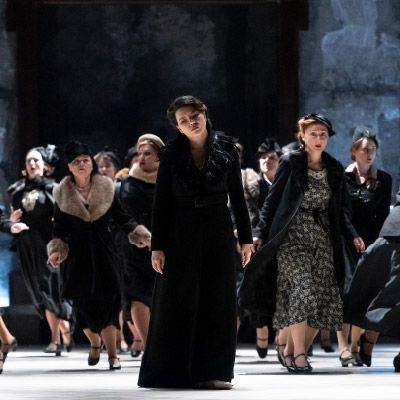| Samstag 07 März 2026 | 19:00 |
| Sonntag 15 März 2026 | 18:00 |
| Donnerstag 02 April 2026 | 19:00 |
| Verdi, Giuseppe (1813-1901) | Nabucco | Libretto von Temistocle Solera |
| Prague State Opera | ||
| Hermann Bäumer | Musikalische Leitung | |
| Tomáš Ondřej Pilař | Regie | |
| Petr Vítek | Bühnenbild | |
| Dana Haklová | Kostüme | |
| Daniel Tesař | Licht | |
| Prague State Opera Chorus | ||
| Prague State Opera Orchestra | ||
| Jitka Slavíková | Dramaturgie | |
| Prague National Theatre Opera Ballet | ||
| Pupils of the Olga Kyndlová Ballet School | ||
| Martin Šinták | Choreographie | |
| Zuzana Kadlčíková | Chorleitung | |
| Vojtěch Fülep | Schauspiel | |
| Michal Soukup | Schauspiel | |
| David Králík | Schauspiel | |
| Vojtěch Svoboda | Schauspiel | |
| Nikoloz Lagvilava | Bariton | Nabucco |
| Stepan Drobit | Bariton | Nabucco |
| Daniela Schillaci | Sopran | Abigaille |
| Oksana Nosatova | Sopran | Abigaille |
| Markéta Cukrová | Mezzosopran | Fenena |
| Stanislava Jirků | Mezzosopran | Fenena |
| Giorgi Chelidze | Bass | Zaccaria |
| Iurie Maimescu | Bass | Zaccaria |
| Richard Samek | Tenor | Ismaele |
| Maksym Voroček | Tenor | Ismaele |
| Josef Moravec | Tenor | Ismaele |
| Jan Hnyk | Bass | High Priest |
| Miloš Horák | Bassbariton | High Priest |
| Vít Šantora | Tenor | Abdallo |
| Michael Skalický | Bariton | Abdallo |
| Michal Bragagnolo | Tenor | Abdallo |
| Veronika Kaiserová | Sopran | Anna |
| Eliška Gattringerová | Sopran | Anna |
The opera Nabucco, depicting the dramatic story of the subjugation of the Israelites by the King of Babylon, ranks among Guiseppe Verdi’s most celebrated works. Phenomenal chorus scenes, extremely impassioned virtuoso arias, as well as the perennially topical themes of expansive war, lust for power, betrayal, life and death, are the reasons why it has always been a staple of opera houses’ repertoire.
The title hero is based on the historical figure of King Nebuchadnezzar II. The opera starts with a true event, the destruction of the Temple of Solomon in 587 BC. Yet the following conversion of Nabucco (Nebuchadnezzar) to Judaism and the setting the Hebrews free from captivity in Babylon are the librettist’s fictional creations, as are the complicated relationships within the royal family, and the strife between Nabucco’s two stepdaughters, striving to win the love of the same man and gain the throne. Loosely blending true historical facts, a biblical legend and imagination, the libretto made it possible for Verdi to bring to bear fully for the first time his immense musical virtues. The colossal triumph of Nabucco, his third opera, at the world premiere at La Scala in Milan in 1842 opened for the 28-year-old composer the path to fame. The opera’s best-known number, the chorus “Va, pensiero, sull‘ali dorate” (“Fly, thought, on wings of gold”), expresses the Hebrew exiles’ hope for freedom.
In Verdi’s time, however, it became a symbol of the Italian patriots’ resistance to Austrian supremacy, an unofficial anthem of the endeavour for a unified Italy free from foreign control; and the chorus has retained its political meaning up to the present day. Just as Verdi’s librettist drew inspiration from the Bible, particularly Psalm 137, biblical symbolism is foregrounded by the stage director Tomáš Ondřej Pilař in his conception of Nabucco’s new State Opera production.


